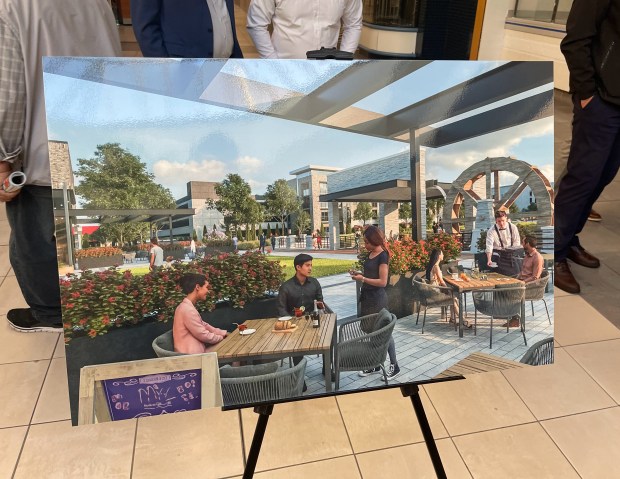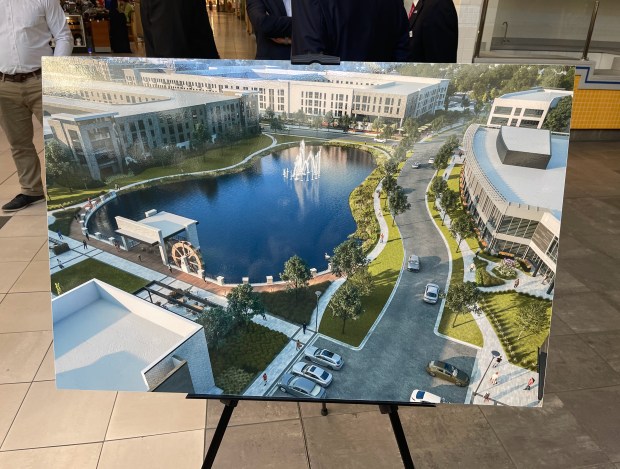The Village of Niles Board of Trustees officially approved a redevelopment agreement with the owners of Golf Mill Shopping Center to redevelop the mall at Tuesday’s board meeting, June 25.
Demolition of much of the indoor mall could start as soon as this fall, according to a village of Niles official, who said many of the larger existing stores would remain open for business through that period. Construction of the new Golf Mill, with outdoor plazas, a pond and a water wheel, is set to begin in late 2025 or early 2026, according to an executive from Sterling Organization, Golf Mill’s owner.
Sterling is expected to spend over $440 million on redevelopment, which will take place over two phases and demolish most of the mall’s existing infrastructure.
Sterling would be eligible to receive up to $96 million in tax increment financing bonds from the village for the first phase of construction at Golf Mill.
Mitch Johnson, the village’s communications and multimedia coordinator, said the first step of redevelopment at Golf Mill will be demolish the round medical office building, the vacant buildings on the property and the enclosed mall. An exact date is not set, but the work is expected to begin in the fourth quarter of 2024. Johnson said Sterling did not give a timeline for how long demolition would take, but did say that projects of that nature can take 60 to 90 days.
Sterling will need to provide access to Target, Burlington, Ross Dress for Less, JCPenney, XSport Fitness, Gordon Food Service, Chick-fil-A, Panera Bread and Chase Bank during the construction phase, Johnson said.
The village’s economic development director, John Melaniphy, said the developer would be eligible for tax increment financing (TIF) funds through partial reimbursements as construction gets underway, meaning that Sterling will need to complete its construction work in phases and get reimbursed by the village once construction is complete.
The reimbursements would be “performance-based,” Melaniphy said. “The TIF incentive will be paid to the developer via TIF bonds issued by the village based on the value of the investment completed and the (tax) increment that they create by this new development,” he said.
Melaniphy said the village and Sterling both have TIF consultants who negotiated the assessed value of Golf Mill’s property tax after each stage of construction to decide how much Sterling should be reimbursed for construction costs.
Melaniphy said the village projects it will receive an increase its sales tax revenue village-wide from $2.3 million to $3.89 million annually with the redeveloped mall, and the redeveloped mall would also increase property tax revenue to the village. Five hundred permanent jobs are also projected to be created, Melaniphy said.
Sterling’s Managing Director of Development and Construction, Dustin Hicks, said the first phase of construction would constitute demolishing a large portion of the mall’s existing infrastructure, including all of the interior common areas and office tower. A central plaza with green spaces surrounded by two restaurants, a water wheel replica of the original at Golf Mill mall, a pavilion, and a pond would be at the redeveloped mall’s center. Hicks said 550,000 square feet of new or renovated retail space would be ready for new stores as well.
The first phase also includes a 300-unit apartment building with studio, one-bedroom, two-bedroom, and three-bedroom units, as well as rooftop amenities and a pool, according to plans. Sterling won’t directly build the residential building, but will either sell the parcel of land it sits on or partner with a developer that will operate it, he said. Hicks said under the redevelopment agreement, the quality of the building materials and amenities will need to be equal to or greater than those at the Sawmill Station development at the southeast corner of Dempster Street and Waukegan Road in Morton Grove. The residential development will not be able to receive any additional TIF incentives.

Sterling will have to go through the regular Planned Unit Development and Zoning approval process the village requires for all developments. Those plans will be more detailed and will be reviewed by the village’s community development department and ultimately approved by the Board of Trustees. Sterling has a two-year deadline to begin construction once the redevelopment agreement gets approved, and is eligible for a one-year extension.
The second phase of construction is anticipated to bring in two more 300-unit apartment buildings, a 60,000 square foot medical office and a 250-room hotel. The entire project is projected to cost Sterling $443 million.
Niles Mayor George Alpogianis described the project as “probably the biggest thing to happen in the village of Niles in 60-plus years, since (Golf Mill) was originally built.” He described the incentive the village is offering as “risk free” to the village’s residents. “There will be no tax increases for this project,” he said. “General funds will not be used at all. There will be no risk for our village’s credit rating or towards our taxpayers whatsoever.”





